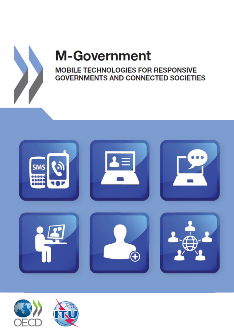 |
| https://www.itu.int/ITU-D/cyb/images/m-government1.png |
Mobile Government can be defined "as a strategy and its implementation involving the utilization of all kinds of wireless and mobile technology, services, applications and devices for improving benefits to the parties involved in eGovernment including citizens, businesses and all government units" (Kushchu and Kuscu, 2003) Some of the early adopters of mGovernment services include law enforcement, fire fighting, emergency medical services, education, health and transportation. For example, mobile technologies are used to support the activities of state officials that are on the move. These officials can communicate among each other and access various information sources through the wireless network. Mobile technologies also help fire fighters to know more about critical data related to a fire incident before arriving.
Adopting mGovernment services has many benefits both for the government and to the people using these services. Some of these benefits include cost reduction, efficiency, transformation of public sector organizations, added convenience and flexibility, better services to citizens, and the ability to reach a larger number of people through mobile devices than would be possible using wired internet only. As with anything that has many benefits, there are also challenges to mGovernment. Some of these challenges include: wireless and mobile networks and related infrastructure, as well as software must be developed, to increase citizen participation and provide citizen-oriented services, governments need to offer easy access to mGovernment information in alternative forms, mobile phone numbers and mobile devices are relatively easily hacked and wireless networks are vulnerable because they use public airwaves to send signals, and many countries have not yet adopted legislation for data and information practices that spell out the rights of citizens and the responsibilities of the data holders (government). Government wants to connect with every citizen and business in their respective nation. eGovernment services already allow the government to connect with many people but the future of eGovernment will involve mobile phones and wireless technologies, which is known as mGovernment.
Sources:

